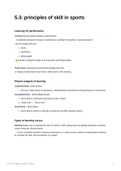Summary
IB Sports Exercise Health Science Summary. Unit 5.3: principles of skill in sports.
- Course
- Institution
Summary of the IB SEHS Unit 5.3 (principles of skill in sports). You will find detailed yet summarized information on the topic, organized according to the IB syllabus (contains all necessary information to achieve a 7).
[Show more]



